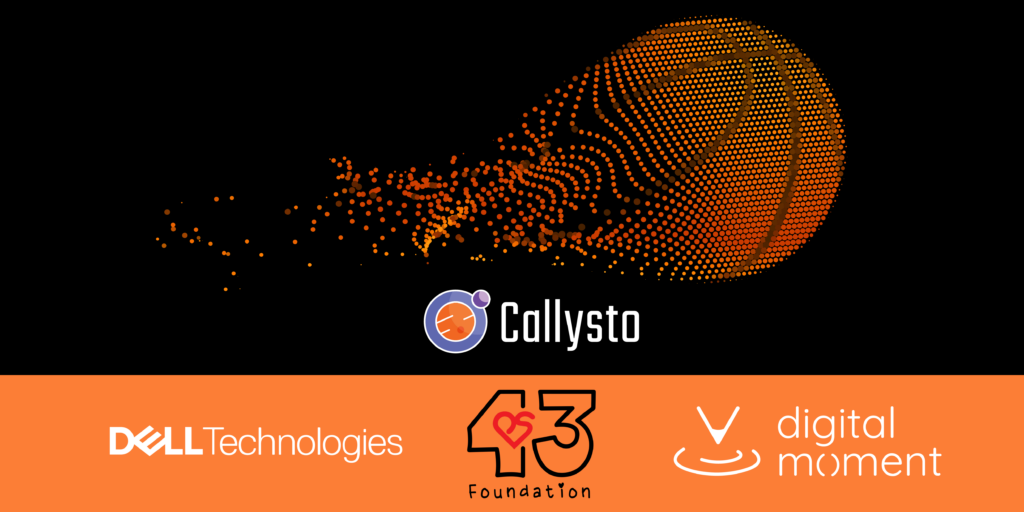In July 2023, Callysto joined forces with Dell Technologies, PS43 Foundation, and Digital Moment to launch an innovative data science program called Data Dunkers. The PS43 Foundation is a not-for-profit organization founded by Pascal Siakam, a two-time NBA All-Star player from the Toronto Raptors, to find unique ways to make a difference in the lives of children through education. The goal of the program is to teach kids how to use data to tell stories, and approach the world with a new perspective. Digital Moment is a national charitable organization with a mission to give every Canadian child access to digital skills education.
The first initiative of this program was a data science and basketball incubator, held in Toronto this past summer. The incubator helped kids apply data science to sports analysis. In this post, we look back at the key highlights of the incubator, and what’s next for this program.
Collaborative efforts at play
Katina Papulkas, Senior Education Strategist at Dell Technologies, reached out to the Callysto team after meeting them at a BCNET conference. They were looking for an organization with experience with data science education, and the Callysto team has spearheaded the resource development. “It has been great to collaborate with the PS43 Foundation, Dell Technologies, and Digital Moment on this data science project,” says David Hay, Education Specialist for Callysto. “Each organization brings unique strengths and opportunities, and these have been great people to work with.”
“We are delighted to be a part of such a talented team,” says Matthew Griffin, Senior Programs Manager at Digital Moment. “As the program rolls out, Digital Moment's team of Learning Specialists will be used to make sure as many teachers and school boards have access to these materials and assistance where they need it."
“The summer data science and basketball incubator demonstrate how, when organizations come together and focus on their strengths, exciting educational experiences happen for kids,” says Katina. “This kind of collaboration is key to innovation in the education space.”
Recapping the students’ journey
During the nine-day incubator, a group of students, who just finished Grade 9, were introduced to the foundational concepts of Python, the most popular and versatile programming language for data science and machine learning. They proceeded to use basic Python syntax, pandas and Plotly libraries to analyze open data from the National Basketball Association (NBA) and the Women's National Basketball Association (WNBA).
In the beginning, students showed differing levels of enthusiasm for basketball and data science, with some demonstrating little interest in either domain. However, as they progressed through the incubator's hands-on problem-solving activities, they gained new skills and their enthusiasm increased.
"Only a handful of students had previous coding experience, and a few were even unfamiliar with basic keyboard shortcuts like copy and paste," explains Lukas Notten, a physics and math teacher at Monsignor Percy Johnson Catholic Secondary School in Toronto. "However, by the conclusion, all of them had acquired noticeably enhanced computer skills and were thrilled with the projects they had completed during their time here."
A unique approach to student engagement and creativity
Lessons on Python, Jupyter Notebooks, and design thinking were intermixed with physical activities, to boost student engagement.
"In the initial stages, our lesson segments were rather lengthy, and we observed that students would become impatient," Lukas recalls. "To address this issue, we transitioned to shorter lesson segments interspersed with basketball games. This approach helped the students stay engaged and focused during the learning blocks.”
Throughout the course of the incubator, students worked on individual data science projects. One student sought to determine whether Pascal Siakam showed improvement in his field goal performance (a basket scored on any shot or tap other than a free throw) over seven seasons. Their findings revealed a positive trend, indicating he consistently increased his shooting accuracy. They also observed that, in the 2019-20 season, Pascal's 3-point shots showed a significant improvement compared to other seasons. The student noted these findings could provide valuable insights for Pascal's coaching staff, helping them identify when he performed best and offering clues about what contributed to his high percentage.
“Being a part of the incubator helped me learn how to take information from anywhere and turn it into a graph,” says one student participant. “But it's not just about making graphs, it's also about the story the graph tells and how the information is shown. The story your graph tells plays a big role in how decisions are made.”
By pooling resources and expertise, Callysto and collaborators orchestrated a fruitful learning experience for the students, hopefully fostering a dual passion for data science and athletics.
A wider roll-out in October
The Data Dunkers program is currently preparing for a larger Toronto-wide launch.
“The plan is to provide professional development and collaboration time with about 30 educators from Toronto Catholic, starting in October,” says David. “This will culminate in an event at the "Raptors 905" (farm team) arena in December.”
After the Toronto roll-out, the goal is for Data Dunkers to be promoted to a wider audience in Ontario, Quebec (translated version), and across the rest of Canada in the coming year.

